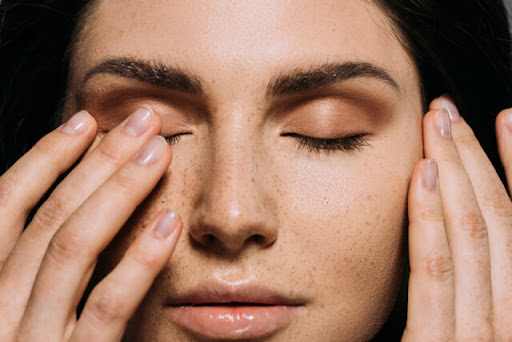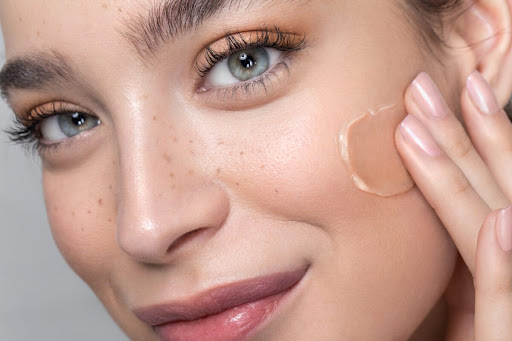Types of Hyperpigmentation & Triggers
What triggers hyperpigmentation?
There are two types of pigmentation: irregular or regular patches of dark pigment, or dark spots on the skin. Depending on your skin type, your hyperpigmentation concerns may be spread out or concentrated in one area. We often associate hyperpigmentation with the face, but patients can see it appear on the back, hands, and shoulders. It is mostly caused by sun damage (UV light) creating excess melanin. This is one of the reasons why we stress that high SPF cream should be a vital part of everyone’s skin care routine. This advice holds for all skin types.
Melanin production
There is a range of treatments available on the market for hyperpigmentation of the skin since it is a common problem. However, before we can determine which treatment is best for you, we must understand what triggers your hyperpigmentation. Various factors can cause hyperpigmentation in individuals, and each individual’s trigger might be different. The most common are:
- Sun exposure
- Hormonal pigmentation
- Postpartum pregnancy
- Age
- Tissue inflammation
- Trauma
- Chemical agents
- Photosensitising medications
- Genetics
- Acne/Acne scarring
- Certain vitamin deficienciesÂ
Hyperpigmentation treatments London
1. Freckles Hyperpigmentation Treatments
Freckles are also caused by hyperpigmentation and exposure to the sun. Freckles usually get darker in the summer and get lighter in the winter. You will mostly find them on the facial skin but they can affect any part of the body.
Hyperpigmentation Treatments for freckles include:
- Herbal Green Peel
- Q-switch laser
- Cosmelan Depigmentation Peel
- (Harmony XL PRO Laser AAFT Technology – DYE VL)
Up to 80% fewer freckles
After the first treatment, we can see an 80% reduction in freckles, and results can last up to two years. Due to the body’s natural process of producing freckles, freckles will return. Clients need to maintain their results and avoid pigmentation triggers by blocking sun exposure with high SPF creams. Don’t forget that the sun burns in places even when you have hair, so sun hats are also important.
Â
2.Post inflammatory Hyperpigmentation Treatments
Compared to the other types of excess skin pigment previously mentioned, post-inflammatory hyperpigmentation (PIH) of the skin is more difficult to treat. A doctor or therapist will have to consider a lot of factors and a range of other treatments. In the case of this type of pigmentation for example, setting the treatment at a lower level may be required to avoid more melanin production to occur within the skin.
After an injury or skin inflammation, such as acne, PIH occurs as a temporary pigmentation mark. We have many treatment options that will provide fantastic results anywhere on the body. The added side effect of some of the below treatments may be an improved complexion due to a reduction in scarring and a fading of fine wrinkles. We recommend the following treatments:
- Q-Switch Laser
- I-Pixel Laser
- Herbal Green Peel
- Cosmelan Depigmentation peel
Â
3. Melasma Hyperpigmentation Treatments
Melasma affects more than 50 million women worldwide and is one of the most common types of skin conditions. It can affect all skin types.
Melasma is a potentially stubborn type of hyperpigmentation. In some cases the pigmentation looks almost like a butterfly mask. So if you have it on one side, you may have it on the other side. This is mostly developed after pregnancy and is linked to hormonal changes.

Skin Peels
For Melasma, one of the most effective treatments is a Cosmelan Depigmentation Peel. This skin peel is one of the market leading chemical peels, clinically proven to treat uneven skin tone , brown patches, age spots, and skin discolouration. Cosmelan skin peels can reduce up to 90% of dark patches in 1 treatment. Cosmelan Peel is an acidic cocktail containing melanin inhibitors as one of its active ingredients. When the pigmentation colour begins to lighten up, we can use skin resurfacing laser treatments.
Be safe
If you have any sort of pigmentation on your skin, book in for a free consultation. We will perform an in-depth analysis of your skin and suggest a treatment plan that is tailored to your exact condition. Please be aware that the vast majority of skin conditions are benign but if you are at all concerned about the look of a skin lesion you should see a doctor to rule out anything more serious.
Book you complimentary patch test and consultation at Derma Revive Skin Clinic to learn more!Â

